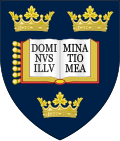Academic career
He was a Research Fellow at Fitzwilliam College from 1967 to 1968, then a Tutorial Fellow at the University of Sussex from 1968 to 1969. He was on the faculty of Lancaster University from 1969 to 1999, rising from Lecturer to Professor of History of Science. With Geoffrey Cantor he gave the Gifford Lectures at the University of Glasgow in 1995. He was appointed the first Andreas Idreos Professor of Science and Religion at The University of Oxford in 1999, where he directed the Ian Ramsey Centre and was a Fellow of Harris Manchester College, Oxford. After his retirement in 2006, he became an Emeritus Fellow of Harris Manchester College and was a Distinguished Fellow of the Institute of Advanced Study in the University of Durham in 2007. [1]
He was the editor of the British Journal for the History of Science from 1989 to 1993. He was the president of the British Society for the History of Science from 1996 to 1998, and has been the president of Science and Religion Forum since 2006. [1] He was also the president of the International Society for Science and Religion (ISSR) from 2008 to 2011. [2] Brooke was subsequently made an Honorary Fellow (HonFISSR).
Evaluations of John Hedley Brooke's contribution to the historiography of "science and religion" can be found in: Science and Religion: New Historical Perspectives (ed. T Dixon, G N Cantor and S Pumfrey) 2010 and Rethinking History, Science and Religion: An Exploration of Conflict and the Complexity Principle (ed. B Lightman) 2019

